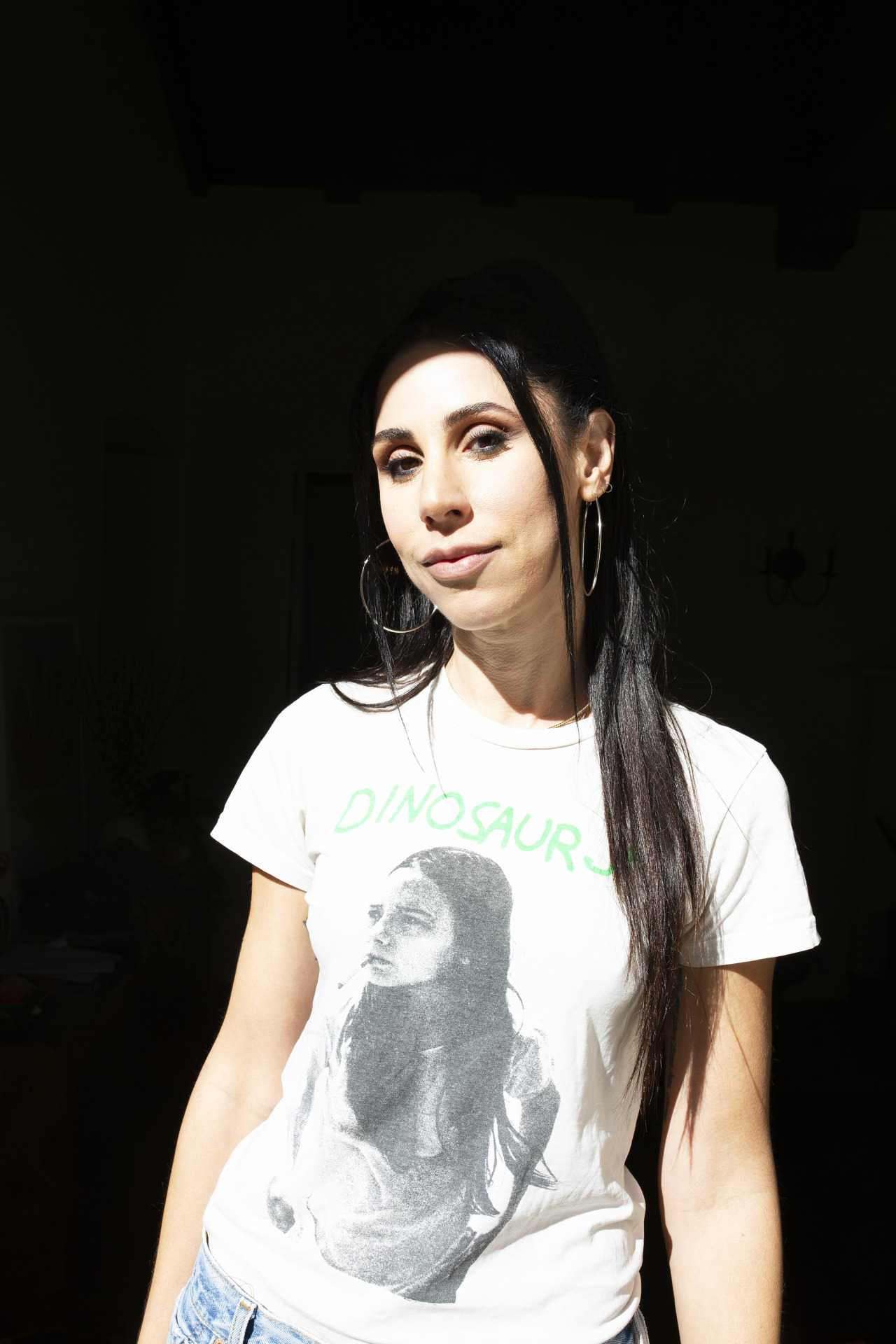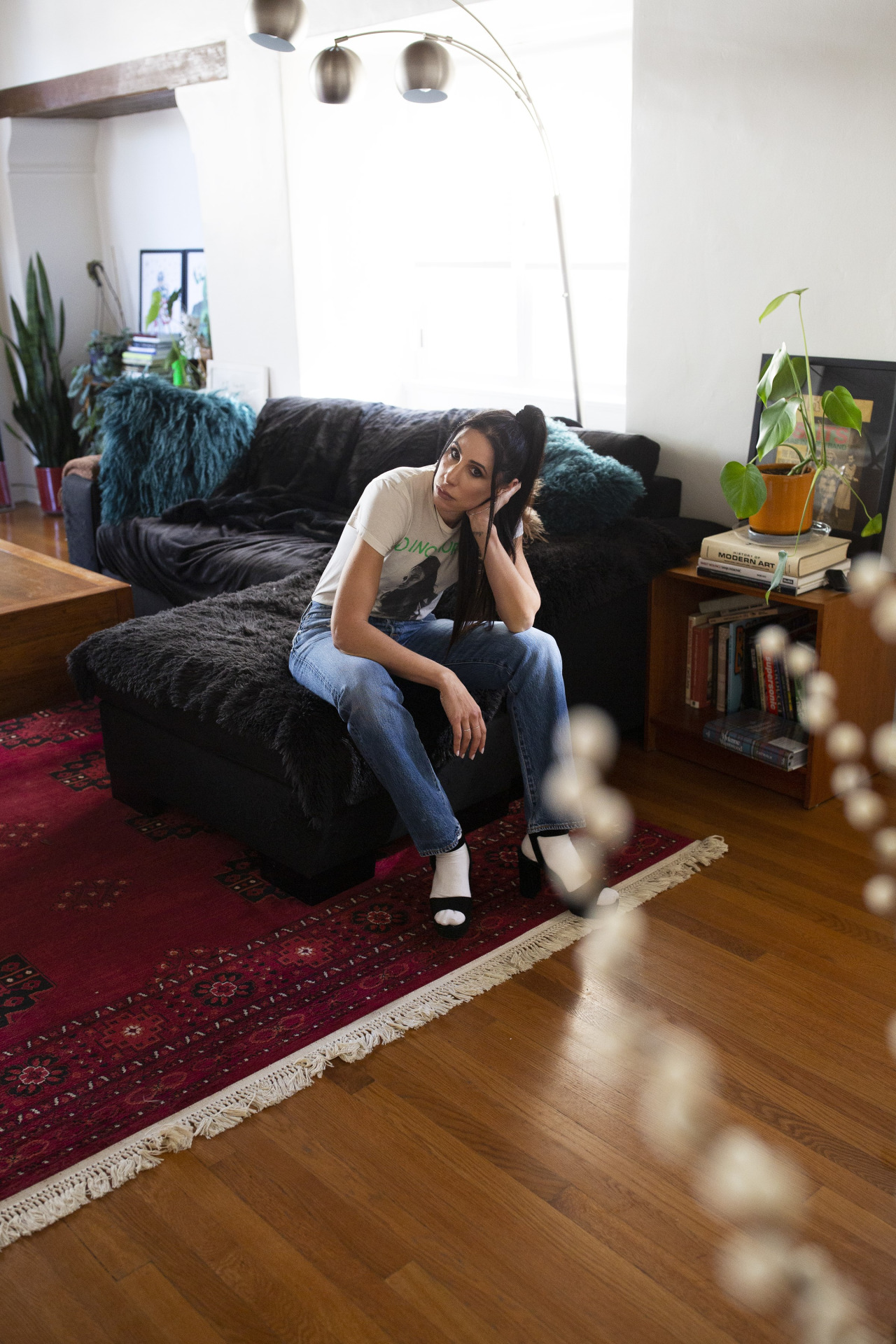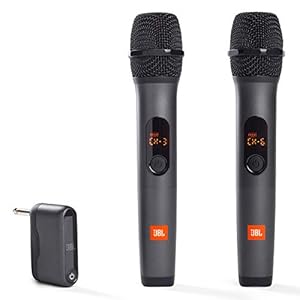Bandsplain’s Yasi Salek will always be a teen at heart

Yasi Salek appears in our Winter 2023 Issue with cover stars Green Day, 070 Shake, Militarie Gun, and Arlo Parks. Head to the AP Shop to grab a copy.
“I get paid to be a teenager,” Yasi Salek tells me over a matcha in Alta Dena. Salek, a first-generation immigrant who was born and raised in Torrance by Iranian parents, is referring to Bandsplain — the podcast series she has spent the last three years diligently building. Cutting her teeth as a music writer, Salek always found the editorial side of the music journalism coin waning, and was eager to find a platform that allowed her to dig deeper not only into the industry and its many players, but her own experience with them, as a fan.
Read more: Militarie Gun are doing it faster
“Publications didn’t want to do what I wanted to do. There was always too much me in there, and they’re like, ‘Can you get that out of there?’ And I felt boxed in by that.” However, it wasn’t until years later, in the middle of the pandemic, that Salek found a platform that could offer her this desired freedom — and would allow her to create it herself.
Seven years into a job at Spotify, Salek was directing videos for the platform’s “Hot Country” playlist and producing Reba McEntire’s podcast, which featured stars like Dolly Parton and Jane Fonda (“You almost feel like you’re with Mickey Mouse, you know what I mean? [Reba’s] such an iconic legend!”) when the pandemic hit. At the same time, Spotify was launching a new tool, “music and talk,” and turned to the team of creatives on staff for ideas on how to showcase it.
That day, Salek’s Bandsplain was born. The podcast is unlike other series on the market. It is a delicious audible wormhole for anyone who loves music, madly and deeply. For those of us who have followed bands from clubs to arenas, whose teenage bedrooms were plastered with fanzines, posters, and liner notes, Bandsplain is here to feed the eternally insatiable fan that prevails inside us, still, as adults. From Mazzy Star to blink-182, Salek and guests — who have ranged from Death Cab for Cutie’s Ben Gibbard to Best Coast’s Bethany Cosentino, digging into their bands of choice, Teenage Fanclub and No Doubt, respectively — burrow into a wormhole that is at times endearingly tangential, and personal, while remaining wholeheartedly informative.
What was the first episode you did?
Steely Dan. It’s changed a lot since the beginning. The original premise was the guest would explain the band to me, and then I don’t know why, but it just morphed into me explaining the band. I just got more and more research-heavy and into that side of it, and then it just completely became what it is today, where I have a hundred-page Google Doc and I know every single thing about this band. I’m going to explain it, and you can just talk to me about it. We’ll fill in the blanks. It’s much harder, but for me, it’s more fulfilling.
Have there been episodes where your guest comes in and says, “I want to do this band,” and you absolutely don’t fuck with them?
All the time. I’m not going to name names, but on the other hand, I would do almost anyone if I thought it would be interesting.
In theory, every band is interesting. And if they’ve broken the mainstream, they are guaranteed to have some crazy stories. It’s like me going to the Eras tour. I’m not a Swiftie by any means, but I can’t help but appreciate the world that’s been built after seeing that show.
That’s what I always take away in the end. It’s impossible to immerse yourself in someone’s entire creative journey and not walk away with respect for it, even if you don’t like it. I might not put on Phish ever in my life, unless I’m in Guantanamo and that’s what’s happening [to get] information out of me. But I was so into the community. They bring people so much joy, and they have this mythology, and they’re passionate, and that’s fucking cool. Whether or not it’s my taste.
Well, it’s just sociology at the end of the day. It’s the study of cults, really. These bands have created “cult followings,” and that’s just what it is.
It’s the study of fandom. That’s one of my deepest interests. I would actually have loved to do a podcast that just focused on fandoms, but the cult ones like the Beehive and the Swifties are something I’ve never personally experienced. You’re like this, too. We love music. It’s part of our identity, but I never made being a fan of one artist my entire identity.

Curtis Buchanan
What is the closest that you came to being a fandom-level fan?
I was always into bands that were either done or before my time. I loved the Replacements when I was 11, but they were not really benefiting. By the time I got really into Nirvana, it was a little too late. But my first favorite band that existed in a time when I was alive was blink-182. blink was my first favorite band that was new and active. This was ’95, ’96. I am from Torrance and would go wherever I could to see them.
I remember they were playing some festival for charity that was on the mountain in Big Bear at the Snowboarders Lounge, and I made my cousin drive because I couldn’t even drive yet. I had pictures with them, on this disposable camera, but I lost it. I never got them at all. So that was probably my first favorite band. I mean, “Carousel.” Still my favorite blink song. Not to mention, my senior quote in my high school yearbook is from “Carousel.”
What kind of music was played in your house when you were growing up?
My parents are from Iran. My mom loved Madonna, so Madonna was my first favorite artist. I was obsessed with Madonna as a small child. I used to tape the videos off MTV on ABHS, so obsessed. And I had The Immaculate Collection. It was one of my first CDs. I’m still obsessed. My dad’s not really a music guy. It’s Iranian music, and that’s about it.
So where was it that you began to figure out what you liked — in school?
This was a turning point: I had a babysitter who was also a family friend, and she was in high school when I must’ve been 9 or 10 years old. And she must have been 15. She was babysitting me and her little sister, and she brought her boyfriend Chuck. Chuck was very hot. I remember being like, “Ooh, hot white guy.” And they were blasting Red Hot Chili Peppers’ Blood Sugar Sex Magik. And when I heard “Give It Away,” my 9-year-old mind broke. From then on, I was just like, “I need more hard, guitar-heavy rock music.” And that was ’91, ’92.
Then I just started watching MTV. Most of it probably came from MTV because by 1992, MTV never got better than that. They’re playing all the Nirvana, Pearl Jam, Soundgarden. And I’m the exact right age to be radicalized by Nirvana, and I became obsessed. There was this used bookstore in Torrance that my dad would take me to, and I found this book called Route 666: On the Road to Nirvana. I didn’t even care what it was really about. It was about Nirvana. And that book turned out to fucking change my life. It’s by this woman Gina Arnold, a music journalist who is now a professor at Stanford. Eventually, I got her on the podcast. In the book, she basically writes about all the music that led up to making it possible for Nirvana to break so big. And it changed everything for me.
That’s such an important storyline in music history, the evolution of grunge. Because at the time, as a genre, it felt like an oxymoron for that kind of music to break. It was almost like those bands found some twisted loophole and defied the way things were destined to go.
It was an absolute crack in the matrix, basically. But she does it through a personal lens. She starts with LA ’80s punk and goes through, and I would just read every band she talked about, saving my allowance money and go do a little shoplifting. That’s how I learned about the Replacements, Fugazi, Dinosaur Jr.
What would your reading list be, if you were to assign one to someone hungry for the best info today?
The sad truth about music books is 90% of ’em are horrible. But Get in the Van, Our Band Could Be Your Life, Route 666: On the Road to Nirvana. There’s a couple of really good biographies. Peter Hook’s Joy Division biography is really good. He’s so funny. Alan McGee, who started Creation Records, his book is all this goss and tea about the [label and] is so good. He’s just calling the Jesus and the Mary Chain miserable cunts. So fucking funny.
But another reason Gina Arnold’s book changed my life was that before I read it, I didn’t know it was possible to talk about music personally. Do you know what I mean? I thought it was just journalism. But then reading her, I was like, “Oh, you can talk about how it affects you. You can talk about your feelings. You can talk about your experience of it.” And that was huge for me. That’s what made me want to be a music writer.
There’s also the point that emotional, personal music books aren’t all biographies. To share your experience, you don’t necessarily have to be a musician. That was hopeful for me, because I can’t play music. But I care so deeply about this world.
Me neither, babe. I’ve tried my whole life. I can’t do it. Everyone’s like, “It’s so easy.” I’m like, “Well, cool. I’m glad for you.” Maybe I’m biased because I couldn’t tell you what a chord progression is to save my life. But I sometimes think people that don’t know how to play music are better equipped to talk about it. It still feels magical to us, and we just talk about the experience of it. I mean, some people want that, right? The breaking down of the exact technical whatever, the Guitar Center men can totally have that. But I just think what’s important in writing about music is context and feeling.
Well, it goes back to the idea of fandom. Which is a different experience with music than playing it, or being onstage. There are a lot of seats in the house, but as an editor and writer, putting two musicians in conversation is different than interviewing them myself, which is also different than writing a profile.
Whenever I interview a musician or band, I try to focus on what I always found interesting, which is who they are. You can’t divorce fandom from it — that fan element of wanting to know who this artist is is what informs your experience of the music. It’s not just some nameless, faceless thing and the music is separate from it. I think showing their personality always gives people a better understanding.
What are you listening to these days?
I talk about them all the time, but probably my favorite new artist is the duo crushed — just spiritual, beautiful, referential but also super modern music. I’m also really into this brand-new artist 2hollis — I love how young people seem to just bypass genre and take whatever they like from every single kind of music. I love Blondshell, Bully, Mannequin Pussy, Spiritual Cramp, julie, Wednesday. I’m really into this new artist from SF my friend Patrick put me on to called Badvril. It’s very Yasi-core, as I like to call anything that is my taste, and usually that means it has some ’90s-type sound in its DNA.
I really love Militarie Gun and all the other newer hardcore and hardcore-adjacent guitar music that also sounds super ’90s — Fiddlehead, Narrow Head, Drug Church, etc. MSPAINT is so cool and weird. Angel Du$t. That band Money is really good. Hotline TNT, Toner. Taking Meds! That new album [Dial M For Meds] is sick. There’s so much good music happening right now.

Curtis Buchanan
What’s the craziest thing that’s happened when you’ve interviewed someone?
When I interviewed Courtney Love. Me and my friend Sarah, we used to have a Fashion Week livestream show for Garage Magazine. This was 10 or 11 years ago. They wouldn’t tell us who the guest was often until the day of. And for NYFW, I was living out of a suitcase, and I would get dressed and then come. So, I’m dressed in my Hole T-shirt, and they’re like, “Today’s guest is Courtney Love.” And I was like, “Do I turn my shirt inside out? Do I go buy something at Uniqlo?” Then finally I was just like, “Fuck it, whatever. I’m in God’s plan.” And she loved it. So that was a huge relief.
We ended up having the best time with her, and then she was like, “Do you guys want to come over?” And we went to her house, and she made us drinks, and we hung out, and it must’ve been the last night of Fashion Week because we were wrecked. My friend Sarah was like, “I’m going to go to the party for Alexander Wang.” But I physically could not go. I felt dead inside.
And Courtney was like, “Stay here, sleep over.” And I was like, “I’m sorry, what?” At 12 years old, my life was changed by Live Through This. It was, and is, my religion. So I stayed over. She gave me pajamas. We watched The West Wing, and in the morning we had breakfast, and after that we kind of became friends.
I could have taken the time machine back to my ugly, awkward, miserable 12-year-old self and be like, “It’s OK. I should hang in there because one day you’re going to sleep over at Courtney’s house. She’s going to make you breakfast, and it’s going to be great. Hang in there, kid, is what I’m saying.”
Link to the source article – https://www.altpress.com/yasi-salek-bandsplain-interview/
Recommended for you
-
Official Kala Learn to Play Ukulele Soprano Starter Kit, Satin Mahogany â Includes online lessons, tuner app, and booklet (KALA-LTP-S)
$84,99 Buy From Amazon -
Gusnilo Guitar Tuner Pegs 1set 3l3r Grover-style Guitar Tuner Grover Tuners Head Gold
$16,99 Buy From Amazon -
JBL Wireless Two Microphone System with Dual-Channel Receiver, Black
$99,95 Buy From Amazon -
BLUES GUITAR REAL – Large Perfect WAVE samples/loops studio Library on DVD or download
$19,99 Buy From Amazon -
Electronic Drum Set, PARAROSE Portable Roll-up 9 Drum Practice Pad with Headphone Jack, Built-in Dual Stereo Speakers Pedals Drum Stick 10 Hours, Ideal Kid Holiday/Christmas Gift Instrument Toy
$69,99 Buy From Amazon -
Ovation Applause AEB4-7S Mid-depth Acoustic-electric Bass – Honeyburst Satin
$457,00 Buy From Amazon -
Eastar B Flat Clarinet for Beginner, Ebonite Clarinet Nickel-plated with 2 Barrels, 3 Reeds, White Gloves, Hard Case, Cleaning Kt, ECL-300
$109,99 Buy From Amazon -
Knobloch Strings, Ambidextrous, Metallic Silver (17)
$31,35 Buy From Amazon













Responses